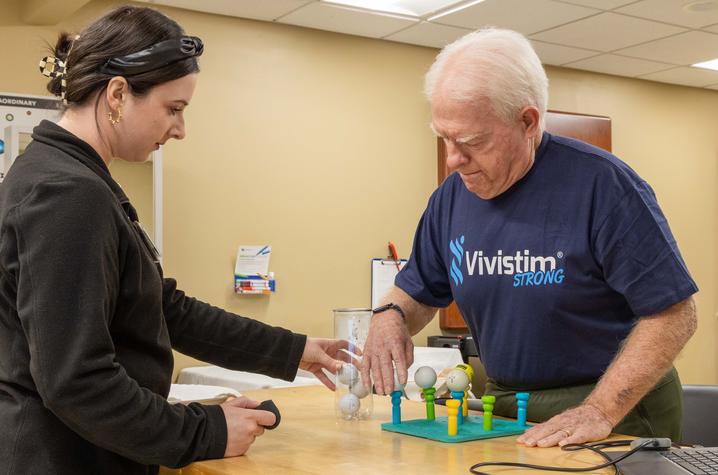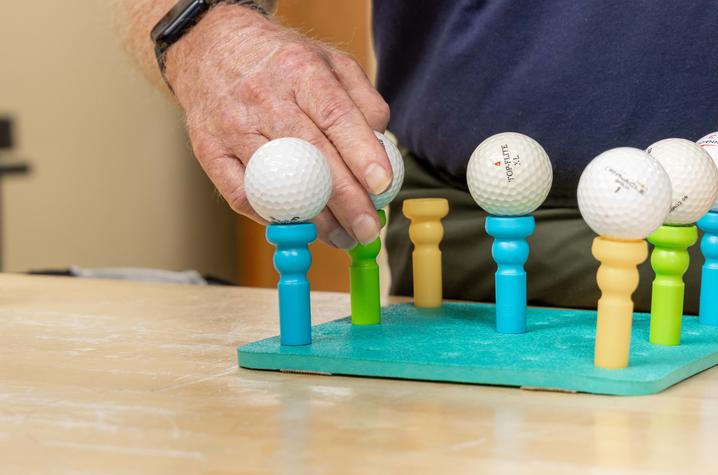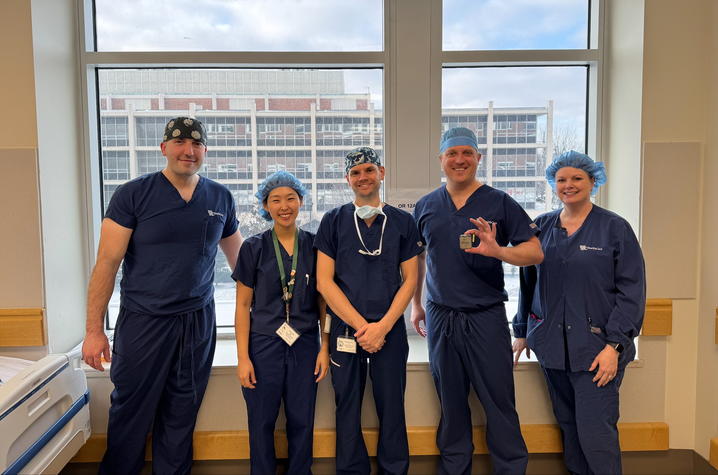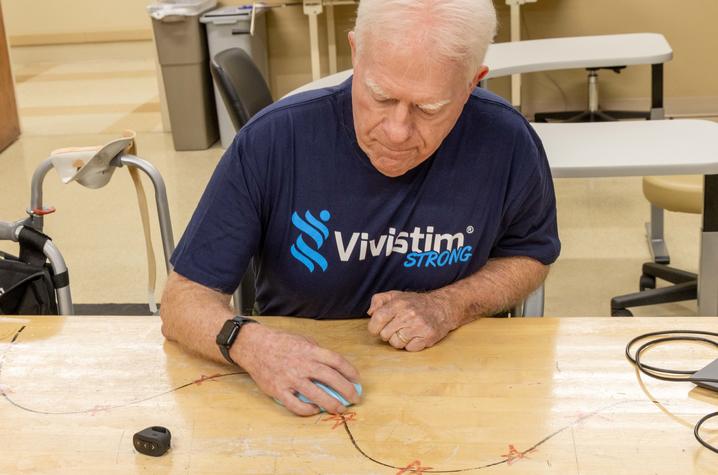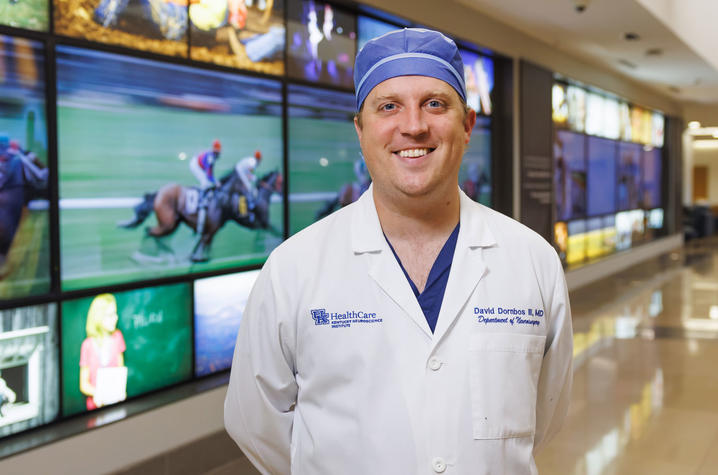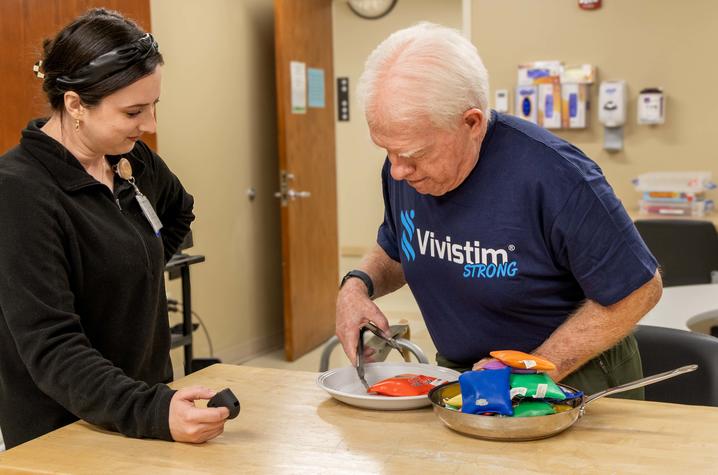UK HealthCare 1st in the state to implant new stroke therapy device
LEXINGTON, Ky. (May 30, 2025) - Nick Lewis is used to pushing forward. As the former publisher of the Richmond Register and an accomplished author of several murder mystery novels, perseverance and creativity are second nature. But when a stroke in April 2024 left him unable to move his right arm, Lewis faced one of the toughest chapters of his life.
“I couldn’t move my arm at all. I could barely move my hand,” Lewis said. “I didn’t want to accept that it was permanent.”
Now, thanks to a groundbreaking therapy, he’s not only regaining strength and function — he’s also making history. Lewis is the first patient in Kentucky to receive the Vivistim® Paired Vagus Nerve Stimulation (VNS) System, a cutting-edge technology that is helping stroke survivors reclaim lost movement and independence.
Making history with a breakthrough therapy
The Vivistim System is a first-of-its-kind, Food and Drug Administration-approved device that pairs targeted vagus nerve stimulation with rehabilitation exercises to help rewire the brain — a process called neuroplasticity — and restore the brain-muscle connection. It’s a promising option for stroke survivors who have plateaued in their recovery using conventional therapy.
For Lewis, who had spent months in traditional outpatient therapy at the UK HealthCare Outpatient Therapy Clinic at Cardinal Hill, the idea of further progress seemed uncertain — until his therapy team introduced the possibility of Vivistim.
“I figured I didn’t have anything to lose and everything to gain,” he said. “If it could help me get even a little more movement back, it would be worth it.”
Lewis received the implant in February 2025 from UK HealthCare neurosurgeon David Dornbos, M.D., who says the arrival of this technology marks a significant milestone in stroke recovery in Kentucky and a major breakthrough for chronic stroke survivors.
“Vivistim is a major transformative advancement in neurorehabilitation for stroke survivors,” said Dornbos. “To have Mr. Lewis be the first in the state to receive this therapy is a testament to both his determination and UK’s leadership in providing patients access to the most advanced treatments available. As a Comprehensive Stroke Center, UK has been a leader in acute stroke care for years, but this new technology allows care across the full continuum of stroke recovery, even decades after the initial injury. We’re excited about the hope this brings to so many others in an area where historically it did not exist.”
The system involves implanting a small device in the chest, similar to a pacemaker, which sends mild electrical pulses to the vagus nerve during rehab exercises. These pulses help strengthen the brain’s ability to create new motor pathways.
The author’s next chapter
Each week, Lewis returns to therapy at Cardinal Hill, where every movement — from reaching to gripping — is paired with electrical stimulation. At home, he uses a magnet to activate the device during his daily exercises.
“I’ve definitely noticed improvement,” he said. “My grip is stronger. I can move my arm more. I’m getting closer to doing things I couldn’t do before, like feeding myself with my right hand and even tying my own shoes.”
Recently, he grilled burgers again, using tongs in his right hand — a small but emotional victory. He also surprised himself by writing his name in cursive for the first time since the stroke, a hopeful sign in his quest to return to writing his next novel.
Before the stroke, Lewis led an active life with his wife — walking regularly, gardening and golfing. A career journalist, he spent four decades in the newspaper business before retiring in 2013. Since then, he’s published a series of murder mysteries and other novels, blending journalistic insight with storytelling flair.
“I’m eager to finish my next one,” Lewis said. “That’s why it’s really important for me to get my right hand working again. Writing is such a big part of who I am.”
Recovery takes grit — and vision
Lewis emphasizes that Vivistim isn’t a miracle cure — it’s a powerful tool that must be paired with consistent therapy and dedication. He puts in hours of rehab both at Cardinal Hill and at home, driven by clear, personal goals.
“You have to use it,” he said. “If a patient doesn’t commit to the therapy at home, they’re not going to see the kind of improvement they want. It takes dedication.”
His occupational therapist Cameron Mullins customizes sessions to real-life goals — like placing a tee and a golf ball to prepare Lewis for one day teeing it up again. Mullins also incorporates high-repetition exercises for tasks such as cooking and computer use.
“A key to neuro rehab is repetition, so the brain can relearn skills,” Mullins said. “Nick is highly motivated, and that makes a huge difference in his progress.”
Hope for stroke survivors
While Lewis continues his recovery journey, he’s proud to be a trailblazer for others — the first in Kentucky to receive this therapy, and certainly not the last.
“I’m proud to be part of something new,” he said. “If it can help me, maybe it can help a lot of other people too. It gives you hope that you can get back what you lost — and maybe even more.”
As he works toward finishing his sixth book, Lewis’s story is already writing itself — one of resilience, innovation, and the power of never giving up.
UK HealthCare is the hospitals and clinics of the University of Kentucky. But it is so much more. It is more than 10,000 dedicated health care professionals committed to providing advanced subspecialty care for the most critically injured and ill patients from the Commonwealth and beyond. It also is the home of the state’s only National Cancer Institute (NCI)-designated Comprehensive Cancer Center, a Level IV Neonatal Intensive Care Unit that cares for the tiniest and sickest newborns and the region’s only Level 1 trauma center.
As an academic research institution, we are continuously pursuing the next generation of cures, treatments, protocols and policies. Our discoveries have the potential to change what’s medically possible within our lifetimes. Our educators and thought leaders are transforming the health care landscape as our six health professions colleges teach the next generation of doctors, nurses, pharmacists and other health care professionals, spreading the highest standards of care. UK HealthCare is the power of advanced medicine committed to creating a healthier Kentucky, now and for generations to come.





